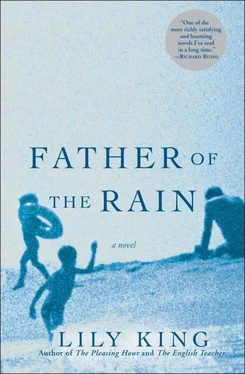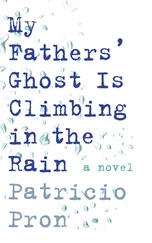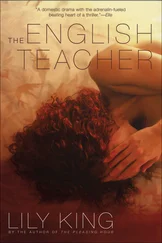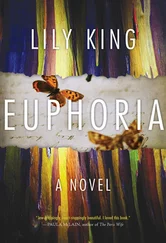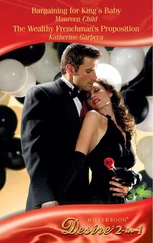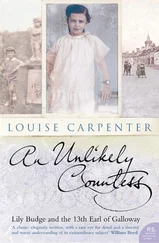But the circumstances are different now. The last time I was here my dissertation was over two thousand pages of notes in a milk crate in the back of my car and I’d just had a bad breakup. But I am beyond all that uncertainty now. Almost miraculously, I think as I walk up the slight incline of Goodale’s parking lot to the glass doors, I have come back to Ashing whole.
It’s been at least a decade since I’ve entered this store and seen Mrs. Goodale glance up in irritation, as if she needed another customer like she needed a hole in her head. I don’t bear much resemblance to my child self: my hair has grown down my back, my skinny frame has filled out a bit, and the defensive grimace I wear in all the old photos is gone. I planned to be a spy in the aisles, listening for any talk of my father and Catherine, for where she might be and if there is any hope of her coming back. But Mrs. Goodale lifts her head and says, without a moment’s pause, “Daley Amory, back from beyond the beyond.”
It’s a bit like being announced by a footman at the entryway of a ball. Her proclamation carries straight back to meats then ricochets across to frozen foods and dairy. Fortunately the store is nearly empty. There’s only my sixth-grade teacher perusing the tomatoes, awful hard pale balls grouped in threes on green Styrofoam trays and wrapped in thick cellophane. Her scowl has deepened, though I think she’s trying to smile at me now. I see she isn’t as old as I once thought. She doesn’t look more than sixty now. She didn’t like me much. I had her the first year we lived on Water Street, the first year of my parents’ divorce. She called me a sullen little girl in the report card that came home at Christmastime. Garvey taunted me about it. He even called me Sully for a while. When, at the end of that year, I got a perfect score on my math exam, she called it a fluke.
I slip into the narrow vegetable aisle and stand beside her, closer than I normally get to people, especially people I don’t like. “Hello, Miss Perth.” I’m not much taller than she is but I have on my favorite shoes, black lace-ups with a chunky heel, and feel like I’m towering over her.
She startles like a cat and steps back. “Oh, it’s you,” she says, not remembering my name. “Gardiner’s sister.”
That reminds me of another thing she said, a few weeks after school had started in the fall: “Well, you’re nothing like your delightful brother, are you?”
“And what are you doing with yourself these days?” She says these days as if she doesn’t approve of the expression but has forgotten how to better articulate the time frame.
I pause. I want to brag, prove to her that I was no fluke in the end, but I want to do it with humility.
“A bit at loose ends, it seems,” she says.
“Not really.” I laugh, but an explanation is frozen in my throat. Defending myself has never been one of my strengths.
“Daley?” A large woman in a navy dress hurries up to me from the back of the store. “God, it is you! You hot shit. Look at you in your shiny shoes!” She envelops me sideways, my shoulder disappearing between her enormous breasts. “I can’t wait to tell Neal you’re home.” This is Mrs. Caffrey. Since I’ve been back I’ve forgotten to remember Neal Caffrey. Please don’t, I think. Please don’t mention my name to Neal.
“He’s here, you know. I mean he lives here. He has a shop.” She points back toward the middle of town. Neal Caffrey runs a shop in Ashing? He won all those subject prizes at graduation in eighth grade, and the big silver cup for excellence in scholarship, athletics, and citizenship. The Renaissance Cup. “He’d love to see you.” She glances at my left ring finger, finds it bare, and gushes on. “I think the two of you would really hit it off.”
“I’m only here for another day. I’m leaving for California on Sunday morning. I’m a professor at Berkeley.” It’s the first time I’ve ever said it like that, in the present tense. I speak loudly, but Miss Perth has turned the corner.
“Oh.” Mrs. Caffrey looks gravely disappointed. She kicks an unpacked box of leeks on the floor. “He’ll never meet anyone in this town. Everyone interesting leaves. Only the screwups hang around.”
This is as much as I’ve ever spoken to Neal’s mother. I remember her in the carpool line. She’d always be out of the car, leaning into someone else’s window, then leaning back out, howling. She had that large person’s jolliness and warmth. Neal didn’t inherit that. By eighth grade he’d become more of a brooder. A popular brooder, though. He had his pick of girls. I never did speak to him after that summer. He didn’t notice. He thought I was concave. That’s what he told Stacy Miller in seventh grade, that I was so flat-chested I was concave. After eighth grade he went on to Exeter while I stayed at the academy.
Someone comes in the store behind us — I feel the short burst of warmer air — and bypasses the vegetable section. I recognize, just from the dimmest shape at the periphery of my vision, Catherine’s long gait.
“So tell me what exactly you’re a professor of, smarty pants,” Mrs. Caffrey asks, her good humor returned to her.
“I have to run. I’m so sorry.”
“Stop by Neal’s shop on the way home! It’s the one with the lighthouse on the sign.”
I duck down the middle aisle where I saw Catherine go, but it’s empty. At the back of the store, Brad Goodale is behind the meat counter, just where I left him in the early eighties. He’s slicing up something for someone I don’t recognize. In the last aisle there are two men my age, studying the yogurt. I rush past them to the front and see that one has his finger hooked in the other’s belt loop. Despite my frenzy I smile, happy that change has come even to Ashing. I reach the register just in time to see the thick dark hair, more cropped than I remember, beyond the door, turning left into the parking lot. I think of chasing her but I don’t think desperation will help my case. And I feel nothing but desperate at this moment.
“Guess she forgot her list,” Mrs. Goodale says as she rings up Miss Perth’s small batch of groceries.
I stare out the plate glass, breathing heavily, still struggling with indecision. I should go stop her before she leaves the parking lot. But is she, in the end, good for him? Wouldn’t he be better off with someone more disciplined? But without someone he may simply self-destruct. I move to the door. And then I see her car, the little burgundy BMW, and on the back a new bumper sticker that says: I’D RATHER BE DIVORCED.”
My father is watching the news in the den. It’s strange to see him back in that room with his ashtray and his drink, as if he never left it for the sunroom and all those years with Catherine. A couch has replaced the recliners that replaced the couch my mother took to Water Street. The room looks almost back to normal, though the slipcovers are made of a nubby wool, something my mother wouldn’t have chosen. He bends his head down to watch the television, his eyes straining up just beneath their hoods. A woman is discussing affirmative action on some courthouse steps. She speaks articulately, quickly, trying to get the most words into her few seconds of time on national TV.
“Why are black people always talking about black people?” my father says in his disgusting version of an African American accent, though the woman speaking has the regionless accent of a newscaster. “Have you noticed that?”
“Because in this country they are defined by their skin color, and they’ve had to fight for every basic right that we get automatically by being born white.”
“Fight for their rights? This woman is fighting for inequality. This woman wants a black C student to be chosen over a straight-A student. She’s fighting for their right to cheat.”
Читать дальше
